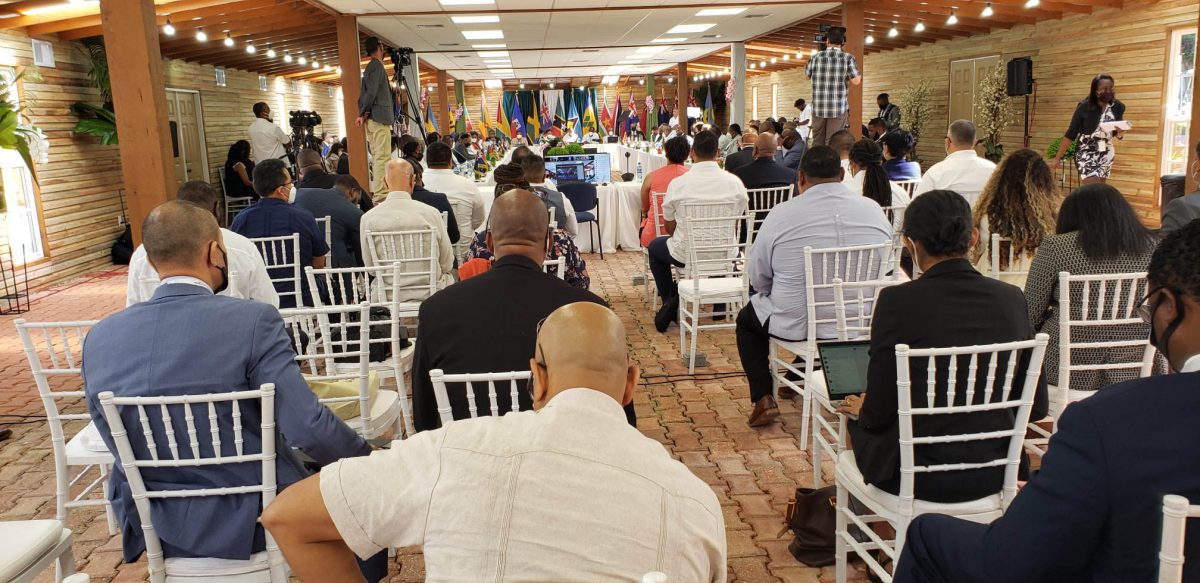One day after Guyana’s President Irfaan Ali presented his plan on the regional agriculture sector to the 33rd Inter-Sessional Meeting of CARICOM Heads in San Pedro, Belize, a decision was taken for this country to host regional leaders and private sector bodies to discuss investment financing.
During his presentation to the CARICOM leaders on Thursday, Ali had announced that Trinidad-based Republic Bank, through the CARICOM Sustainability Agriculture Credit Facility will be offering up to $20 billion (US$100 million) in financing for the development of the agriculture sector. The Guyanese head of state is heading the Special Ministerial Taskforce on Agriculture, Agricultural Diversification and Food Security with the aim of reducing the region’s US$6 billion food import bill by 25% by 2025.
According to Ali’s report to the conference, Republic Bank has offered to fund agricultural projects inclusive of the development of priority crops, capital equipment for farming, feeder roads to provide access to arable lands, bulk storage for crops, processing plants, shade house farming at very low-interest rates starting at 2.5%.
At the concluding press conference yesterday, Barbados Prime Minister Mia Mottley said that the region needs to move with dispatch in getting investment opportunities to facilitate its food security ambitions amidst the growing supply chain bottlenecks and political instability.
“The next step is on May 19 an investment conference in Georgetown, Guyana (from) May 19 to the 21st where we seek to bring together both the public and private sector in order to determine what the investment opportunities are,” Mottley told the regional media.
Based on the report presented by President Ali, the region imported over US$240 million in poultry but that can be eliminated with increased production. At the press conference, Mottley, who will be heading the CARICOM Economic Recovery and Transformation Working Committee, said that the leaders recognised that the region can become self-sufficient in poultry as well as stock feed for the sector.
“We recognize that we can also seek to position ourselves by 2025 to be self-sufficient in the feedstock for poultry while still having the capacity to export. And to that extent, President Ali was able to make the point that 25,000 hectares will be needed to be dedicated to corn and soybean production and if we can do that throughout the region, not just Guyana (because) Guyana is more than willing, but Suriname, Belize, Jamaica in particular (we would meet the self-sufficiency target),” she said.
The Barbadian leader said that the investment conference in Guyana is a necessary prerequisite to achieving the target because, without the necessary financing, the countries cannot help farmers increase production.
“The money from Republic Bank is effectively being offered to governments to help farmers and in some instances that will be state-led and in some instances … private sector-led. In addition, the Caribbean Private Sector Organization made a presentation looking at the poultry sector in particular, and recognizing the opportunities there. So we hope that the private sector or the regional private sector will also come to the table ready to make the decisions for investment that will allow us to achieve this target of 25 by 25,” she related.
President Ali had left before the press conference started but Prime Minister Mottley, delving deeper into his proposals to regional leaders, said that a number of root crops and vegetables were looked at with the hopes of expanding production. She explained that the report was detailed in its analysis of the region’s agriculture sector and the path to be forged ahead in achieving food security.
Providing some context on the “25 by 2025” aim, PM Mottley explained that it was agreed upon in Barbados back in 2018 following a meeting of regional Agriculture Ministers. At that meeting, the Bajan leader said, it was determined that there is a dire need for the region to reduce the volume of imports while at the same time increasing the opportunities for the agricultural sector.
“I, therefore, am more than happy to see that President Ali who has responsibility in the quasi cabinet for agriculture and food security, was able to move with dispatch, even in the midst of a pandemic over the course of the last year to bring together the Ministers of Agriculture to work with financers, to meet with companies dealing with possibilities for crop insurance, to deal with the barriers – the sanitary and phytosanitary barriers we now have to address fully,” Mottley said in praise of the Guyanese leader’s charge on meeting the region’s goal.
She said that a lot of the crops that were identified in the report are 6-12 week crops which makes the target even more achievable since the region possesses the capacity to meet the demands.
“…but it requires political will, it requires bringing together the complexity of the issues from crop insurance and a climate crisis, to access to financing to remove the barriers to insurance to technology and the access to the land and of course, to a population willing to work the land in order to produce the goods.
“We believe that the infusion of technology and capital can make a huge difference and President Ali also pointed out the importance of digitization in terms of different processes within food production in the region that we need to embrace,” Mottley explained.
Current Chairman of CARICOM Prime Minister of Belize John Antonio Briceño congratulated Ali on his plan noting that it is a comprehensive study that addresses the issue of food security.






